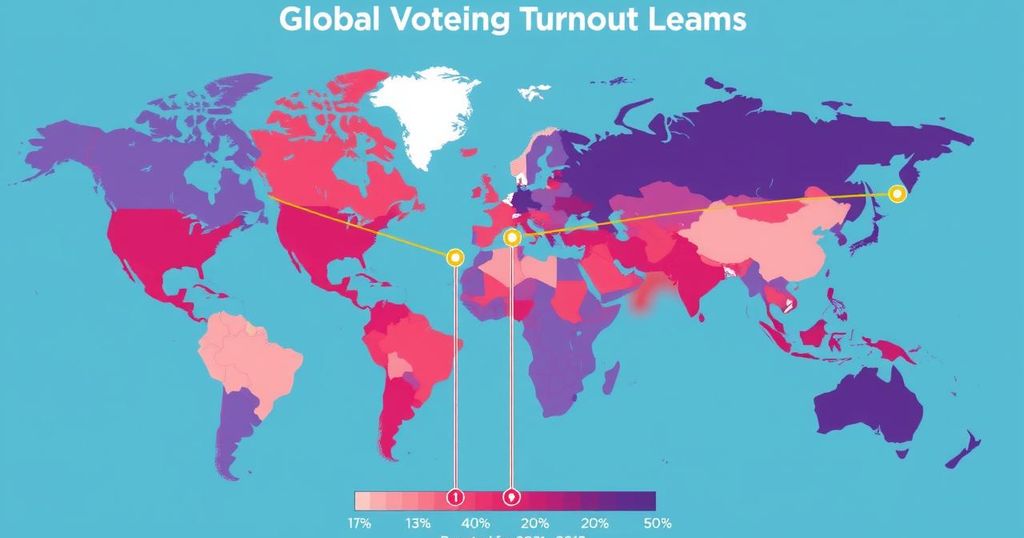Democracy’s Turning Point: The Lessons from the 2024 Global Elections
In 2024, over 60 countries voted, highlighting an unprecedented global democratic engagement that represented nearly half the world’s population. Despite this surge in participation, economic concerns dominated voter preferences, leading to significant losses for incumbents like Biden and Modi. Populist waves impacted traditional parties across Europe, while incidents in Russia demonstrated a serious regression of democratic standards. Subsequent geopolitical implications may shift international relations, particularly between the U.S. and Ukraine, as democracies confront evolving challenges.
The year 2024 emerged as a pivotal moment in global democracy, with over 60 nations representing nearly half of the world’s population engaged in electing their leaders. This unprecedented wave of voting revealed not only the aspirations of various societies but also exposed inherent selfishness and tribalism among the electorate. As economic anxieties overshadowed climate change concerns, voters appeared motivated primarily by immediate self-interests, often leading to the replacement of incumbent leaders across many nations.
In the United Kingdom, the Labour Party’s triumph had much to do with economic issues, as voters prioritized daily survival over long-term sustainability. Similarly, in the United States, President Joe Biden faced backlash despite reducing inflation, as public dissatisfaction with stagnant wages and high prices propelled Donald Trump back into a competitive position. Across Europe, the trend of favoring political change was prevalent, with significant losses for traditional parties in high-profile elections.
The outcomes in India, South Africa, and the European Union signaled a broader rejection of incumbents amidst economic distress, while Brazil and Mexico showcased different dynamics, with the latter’s governing party surprisingly gaining traction. Notably, President Macron in France showed vulnerability despite his reform-oriented agenda. He called for election following populist gains, demonstrating the fragility of support for centrist politics in times of economic uncertainty.
In stark contrast, Vladimir Putin’s continued dominance in Russia raised alarms as his administration exemplified the antithesis of democratic principles, with reports of political repression and manipulation of electoral processes. The results of the 2024 elections encapsulated a complex web of motivations behind voting behavior globally, highlighting an urgent need for introspection within democracies as they navigate the evolving political landscape amid a backdrop of economic hardship and geopolitical challenges.
Furthermore, these elections may have profound implications for international relations, particularly regarding the United States and its stance on foreign conflicts. Trump’s return to power could potentially reshape American foreign policy towards isolationism, affecting global dynamics, especially in relation to Ukraine’s democratization stunted by ongoing aggression from Russia. Ultimately, the global embrace of democracy in 2024 serves as a reminder of the shared responsibility among nations in safeguarding democratic ideals and processes.
The lesson from this year’s elections should not be overlooked: while substantial progress in democratic participation has been achieved, it must be coupled with a commitment to collective interests and long-term sustainability. The pressing challenge now lies in reconciling immediate political desires with the imperative of fostering a more inclusive and enduring democratic future.
The 2024 global elections marked a significant moment in contemporary democracy as nearly half of the world’s population engaged in choosing their leaders. This unprecedented electoral activity spanned over 60 countries, signifying an evolutionary leap towards more inclusive democratic participation. However, an analysis of voter behavior suggests underlying concerns, primarily economic grievances and self-interests, played a critical role in shaping the outcomes, indicating a deviation from collective priorities. The results reflect a broader narrative of democratic engagement confronted by pressing global issues such as economic hardship and climate change, which often take a backseat in the face of immediate survival needs. Thus, the evolving political landscape offers a crucial opportunity for reflection on the relationship between voters’ perceptions and the health of democracies around the world.
The 2024 elections underscored both the advances made in democratic participation and the significant challenges that persist within global democracies. As many voters prioritized economic stability and immediate self-interests over long-term considerations, traditional party structures faced substantial upheaval. Politicians such as Donald Trump and Vladimir Putin remind us of the dangers of undermining democratic ideals for populism or authoritarianism. The adoption of democratic processes on a global scale must be accompanied by a concerted effort to address pressing issues like economic inequality and climate change, ensuring that democracy enriches collective well-being rather than merely serving immediate personal interests. Looking forward, the global political landscape will need to engage thoughtfully with the lessons learned from 2024, aiming for sustained and inclusive progress.
Original Source: www.cnn.com




Post Comment